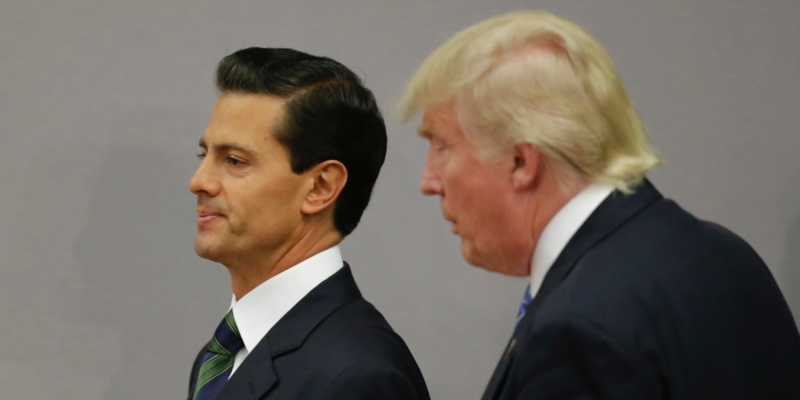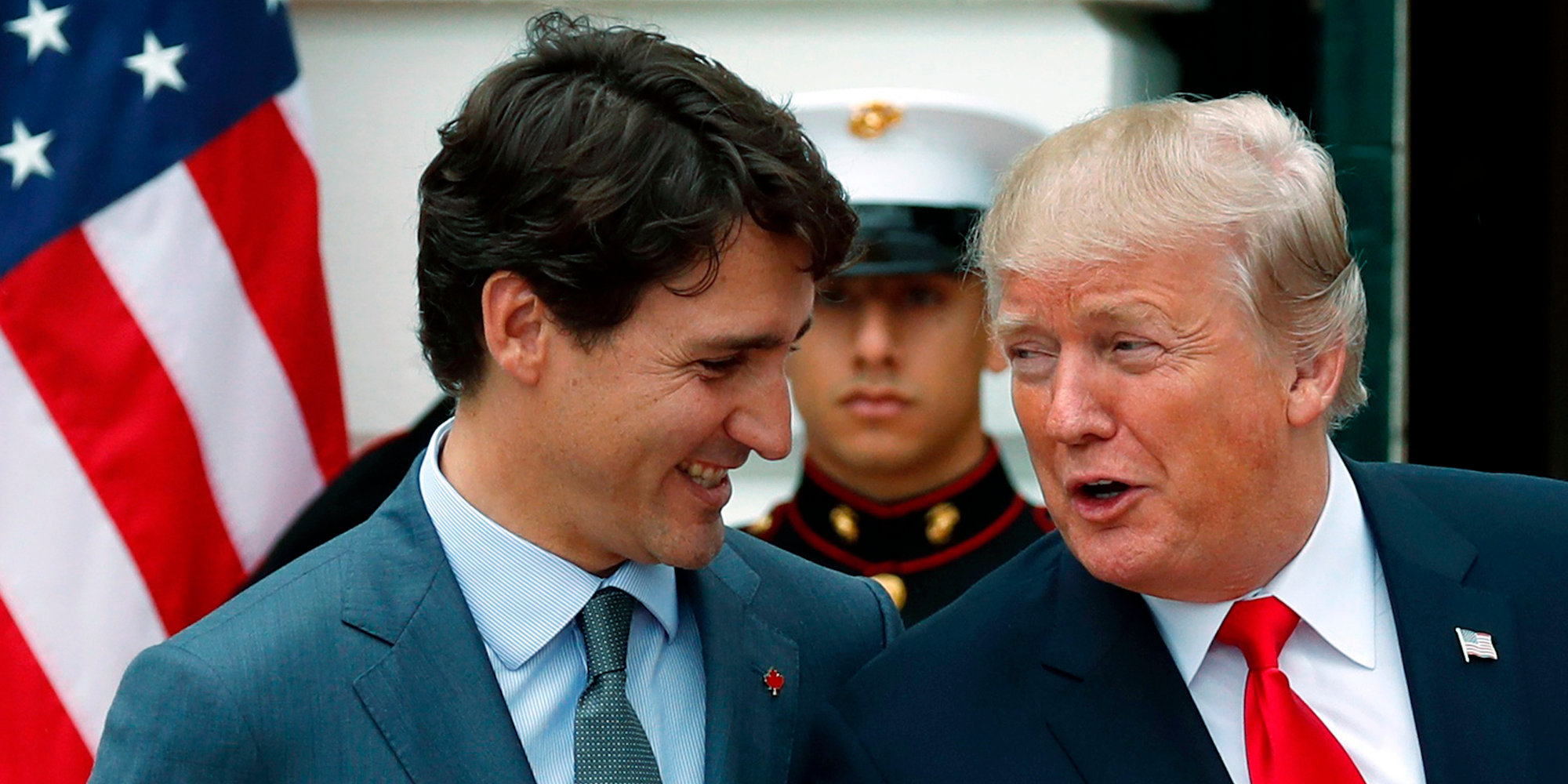- Donald Trump’s negotiating strategy didn’t serve him well in the private sector.
- It’s serving him even less well in government and as president.
- There will be occasions where Trump’s tactic of hostage-taking and threatening and generally being too much of a pain to be worth fighting against will work.
- But on average, it will not.
Donald Trump has a negotiating tactic he really likes: Threaten to do something someone else will really hate, and then offer to stop if they give you what you want.
Call it the “Why are you hitting yourself?” approach to diplomacy.
One of his tactics on trade, for example, is to impose a variety of tariffs on Canada and Mexico on “national security” grounds in hopes of getting them to agree to modify NAFTA according to his terms.
He uses the strategy in domestic politics, too. For example, he has threatened to end the DACA immigration program, then ramped up the separation of asylum-seeking immigrant families, in an effort to press Congress to remake immigration law on his terms, including building a wall.
Trump honed this tactic in the real-estate business, developing a reputation as a nightmare counterparty, someone who wouldn't pay all of his contractor invoices and who would make seeking payment so painful that, sometimes, people wouldn't even bother.
He even ended up in a years-long legal battle for failing to pay his chandelier guy. (Trump told the Palm Beach Post he didn't pay up because the man did "a terrible, terrible job" and was late.)
The tactic didn't always serve him well in the private sector. For example, he had to scrounge for new funding sources after alienating most of the banks in the US with his reputation for not repaying debt.
It has served him even worse in government.
The difference is that contractor can make a dispassionate analysis of whether it's worth fighting a vexatious client. Is it really worth going to court to get the last invoice paid for these cabinets? The vendor might be angry, but at the end of the day, it's a question of whether the costs of fighting Trump exceed the benefits. And next time, he can just refuse to sell Trump anything at all.
In government, a combination of pride and political constraints make it very difficult for Trump's counterparties to take the hit and give him what he wants so he will go away. Plus, they know they will have to deal with him in the future and had better not get a reputation for folding easily.
Threatening Mexico won't make them pay for the wall

You would think that a guy who so highly rates the importance of looking strong would know better than to put his counterparties in a position where giving him what he wants makes them look weak and small.
And yet, he has done that, over and over.
He has personally insulted the people of Mexico ("they're not sending their best") and forced Mexico's president into a position where he must show defiance to save face. In elections next month, the Mexican public is set to pick a president with an even more adversarial stance toward Trump.
Now, Trump is repeating that process with our northern neighbor, pushing even opposition politicians to rally around Prime Minister Justin Trudeau for his willingness to stand up to our president. How does that bode for Trump's chances of talking the Canadians into giving up their dairy tariffs?
Canada's dairy protectionism is a misguided - if not especially important - policy that nonetheless gets political support borne out of an impulse to protect an industry that is connected to national identity. Trump should have some familiarity with that impulse, given the way he views steel.
Does he think seeking to humiliate Canada will weaken that impulse or strengthen it?
Threatening Democrats won't make them pass the Trump agenda
Similarly, Trump's theory of immigration politics has been misguided.
If he shows a willingness to be more cruel, he thinks that will force Democrats to the table, and that they will essentially bribe him into not mistreating vulnerable people by enacting immigration policies he's long wanted.
Look at this hostage I've taken, he thinks. How could they possibly let me shoot it?
They will.
First of all, we know Democrats can tolerate dire conditions for asylum seekers because they did so during the Obama administration. Trump is absolutely making asylum policy less kind than it used to be, but Attorney General Jeff Sessions' recent admonition that asylum does not simply exist to help people in bad circumstances - even very bad ones - already informed asylum policy before Trump took office.
It's not like we used to have an open-door policy to everyone who faced danger elsewhere.
In recent years, about 90% of central Americans who have sought asylum in the US have not had their applications approved. Many of these people faced extremely difficult circumstances in their home countries and yet did not meet qualifications for asylum under Obama.
Democrats know immigration policy is a long game and making long-run concessions in exchange for short-term changes on DACA and other matters would be foolish, especially since Trump can't be trusted to implement a compromise on terms to which he agrees.
And then there is the matter of saving face. When Trump behaves horribly, that makes Democratic voters want to see Democratic officials stand up to him, not cut deals in hopes that he will stop being horrible.
You can't poison the well and then expect people to drink from it just because you promise that, if they do, you won't poison the well again.
The circumstances where Trump's tactic has worked are instructive

It's not that Trump never bullies anybody into doing what he wants.
In particular, Trump's reputation for a willingness to pick costly and petty fights has helped to keep his party in line behind him. Republican politicians are afraid, with good reason, that Trump will annihilate them with their base if they cross him.
But Republican politicians are unusual: They are a rare Trump counterparty that is accountable to a constituency that overwhelmingly likes Trump. He can count on the voters to back up his aggressive tactics. This is not so with Democratic politicians or foreign leaders.
It's usually not true with companies, either, though the NFL is an interesting exception: They are accountable to constituencies that strongly like and strongly dislike Trump, which has led them to fumble for a compromise response to his aggression that has pleased nobody.
Trudeau faces no such cross-pressures.
There is one other key instance where Trump's strategy of aggression and cost-imposition has worked: By declaring his intention to cancel the Singapore summit with Kim Jong Un, Trump forced the North Korean leader to back down from his aggressive anti-US rhetoric and show weakness: He was too invested in having the summit to respond aggressively when Trump called his bluff.
However, this is an incremental victory. Trump showed Kim was desperate to meet, but Kim was desperate to meet because he believed the summit would serve key North Korean diplomatic objectives. In future situations, where Trump's sticks are not accompanied by a carrot Kim really really wants, I would not assume this technique will work again.
The world is not a faux-luxury condo deal
Whether Trump's approach to business even works in business is an interesting question.
Certainly, Trump is a very rich man, even richer than could be expected from his large inheritance. (Here's your corrective to the claim he hasn't even beaten the market.)
But there's a reason most business people don't behave like Trump does. Developing a reputation for being unreliable and difficult to work with makes it hard to get people to do business with you.
Trump's reputation has made it hard for him to find development partners, and is one of the things that ultimately pushed him into a business that was more about licensing his name to other people's real-estate projects than developing his own.
When you're president, you have to actually make some things happen, not just build your brand and license it around. And you have to work with the allies you have. You can finance (some) real-estate projects without traditional banks, but you can't operate the western alliance without Canada and the EU and Japan and other allies whom Trump seems determined to threaten and bully and alienate.
There will be occasions where Trump's tactic of hostage-taking and threatening and generally being too much of a pain to be worth fighting against will work. But on average, it will not.

